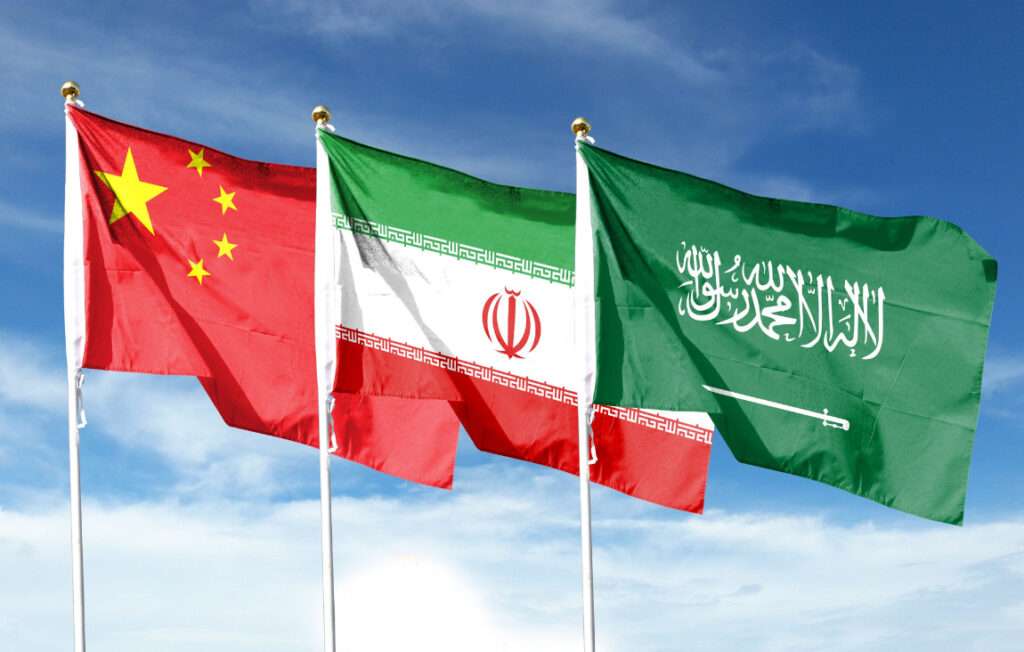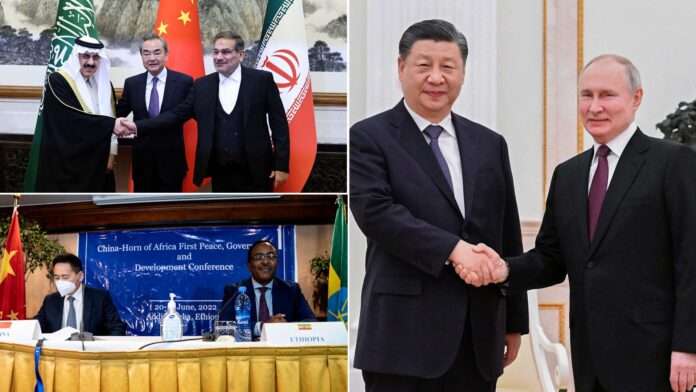Context
One of the key theaters of the shifting balance of power is Europe, where Russia and China had been gradually encroaching. Europe has primarily been under the American Sphere of Influence since the World War II. Corona pandemic and ‘Decoupling from China’ was already impacting the global supply chains, but the Ukraine conflict has thrown an added wrench. The question is – how are the Ukraine war and its tentacles impacting the balance of power in South Asia? The region already has a fair share of fault lines, to include Pakistan-India tensions, dealing with extremism – especially after the US withdrawal from Afghanistan, and growing China-India border tensions. Moreover, the geopolitics of the neighboring Middle East is likely to have a profound impact on what transpires in South Asia, especially as China establishes its role as the global peace maker. While India is a key pivot of the Indo-Pacific strategy, it’s not a member of NATO. However, it is a part of BRICS and recently joined Shanghai Cooperation Organization (SCO) as well.
Analysis
A majority of nations from South Asia abstained from the UNGA vote which took place in Feb 2023, and was critical of Russian invasion of Ukraine and demanded that its forces withdrew. Generally, three main characters factored in the equation.
Big Versus Small Nations
The smaller nations have usually voted in favor of Ukraine – because of the threats posed by larger powers. For example, fearing China and India, Bhutan and Nepal have sided with the US.
Multipolarity
Pakistan, India and Afghanistan
On the other hand, other nations of South Asia gave more weight to multipolarity and abstained from condemning Russia. They want to avoid being dependent on any one power when the global balance of power is in flux. This can be stated for Pakistan, which is also a strategic partner of China and hosting one of the key arteries of China’s Belt and Road Initiative (BRI), China-Pakistan Economic Corridor (CPEC). The country has one more challenge to contemplate, it has been an ally of the West since its creation in 1947. It played a decisive role in bringing down the Soviet Union by supporting the jihadist in Afghanistan in the 80s – concluding the Cold War.
However, Pakistan is doing itself a big disservice by not criticizing Russia, especially if India were to make aggressive maneuvers towards Pakistan Administered Kashmir – as some Indian politicians have often proclaimed in relation to Gilgit-Baltistan. On the contrary, India has refrained from condemning Russia while at the same time being a strategic partner of the US. As opposed to Pakistan, India has had long cordial ties with Russia while it remained part of the Non-Aligned Movement during the Cold War. In the last five years, Russia has supplied India more than $13 billion worth of arms and depends on it for 60 percent of its military equipment. As opposed to the emerging untested ties with the West, veto-yielding Russia has traditionally proven to be a dependable ally of India. The country simply cannot burn these relations because of Ukraine. In essence, India is pulling a balancing act by assisting West to prevent the rise of China, but at the same time having Russia on its side as a taming influence over China. All three players are part of Shanghai Cooperation Organization (SCO) and BRICS (Brazil, Russia, India, China, South Africa). Prominent Indian foreign affairs experts think that this is a risky posture for the country. Shashi Tharoor recently stated in an interview on Wire channel, by not opposing the Russian invasion of Ukraine, the nation is setting itself up if China-India border tensions were to escalate. He went on to add that usually India stands for non-intervention and state sovereignty, which it is not doing in the case of the Russian invasion of Ukraine. In short, as international actors switch alliances or attempt to balance them – there is also the assessment of who is likely to prevail- and how that’s related to maintaining the existing ties and alliances. Meanwhile, as the global attention has shifted to Ukraine, it has provided Afghan Taliban with space. The opportunistic postures of Afghan Taliban are meant to exploit the fears of stakeholders like US, China, Russia, Pakistan, India, and Iran – and by maintaining a leverage of extremism over all of them. For example, it has kept the TTP gambit over Pakistan, while at the same time offering India to keep a check on LeT and Al Qaeda in the Indian Subcontinent (AQIS), and then delicately adjusting its policy towards global extremists (AQ and ISIS-K) and other Western concerns – including women rights and inclusion of minorities in governance. And thus, the question becomes where do Afghan Taliban, including the regional and global extremists that operate from Afghanistan, fit in the great power rivalry equation. Since the US withdrawal, both China and Russia are attempting to build trade ties with Afghanistan.

BRICS and SCO
One of the biggest casualties of the Ukraine conflict are the organizations representing the emerging powers, the SCO and BRICS, in which India has emerged as a major detractor. US and Indian interests are convergent when it comes to Afghanistan and Pakistan. However, India has consistently taken a position against foreign intervention, in places like Libya and Syria, just as China, Russia, and Pakistan. India is also aligned with the Indo-Pacific strategy and that is what complicates its role in both the SCO and BRICS. It simply cannot be a member of both the emerging power club, and established powers, at the same time. This was evident at the recently held G-20 foreign ministers meetings in India, which were marred by differences over Ukraine and attempted Indian balancing act while maintaining strategic autonomy.
Like in Europe, Ukraine has also become a test case for the tussles of the balance of power in South Asia. European dependency on Russian energy needs coupled with China’s economic penetration was considered a liability. As the Ukraine war unfolded, Europe is having to manage by using other energy resources – and decoupling from China is also underway. In the South Asia theater, before the withdrawal of US forces from Afghanistan – our nation had become the epicenter of the balance of power struggle. It was believed that if Afghan Taliban were to prevail, the influence of its backer Pakistan and its strategic ally China, would multiply. However, things have not necessarily played out that way. In fact, the great power competition has left the country turned completely inward while facing an economic meltdown.
Moreover, in recent years the China-India border tensions have increased but both nations have remained engaged in trade. Just as European powers of Germany and France do not want to completely burn bridges with Russia, similarly, India does not desire to turn entirely against China, especially when it shares memberships in two major platforms, SCO and BRICS. Moreover, India conducted more than $135 billion of trade with China in 2022 while buying military equipment and cheap energy resources from Russia, there are no prospects for decoupling from China or Russia. On the other hand, US-India trade amounts to more than $700 billion. India remains a US ally while doing business with Iran and Russia. It has received waivers from different US sanctions for building the Iranian Chabahar Port, buying Cheap Russian oil, and acquiring Russian S-400 air defense system.
China the Peace Maker
The recent development of Chinese acting as peacemaker between Iran and Saudi Arabia could be a game changer in the dynamics of regional balance of power. China has presented a 12 point paper to resolve the Ukraine conflict. As the power tussles in the Middle East play out, China is likely to assert more and act as a mediator in other longstanding conflicts, such as the Israeli-Palestinian conflict and the larger Middle East Peace Process, as noted by PoliTact previously. In fact, in Chinese assessment the road to the Israeli-Palestinian conflict likely runs through the Iran-Saudi rapprochement. Just like Iran and Saudi Arabia, China has also cordial ties with Israel.This approach stands in contrast to the Outside-In approach to the Israeli-Palestinian conflict. Chinese peacemaker role could undercut US influence in the Middle East, which can restrict space for India as well. As China and Russia reach out to manifest their influence, they seem to be having more success in countries that do not have a democratic government. Meanwhile, democracy and democratic norms are faltering in Pakistan, India, and Bangladesh.





